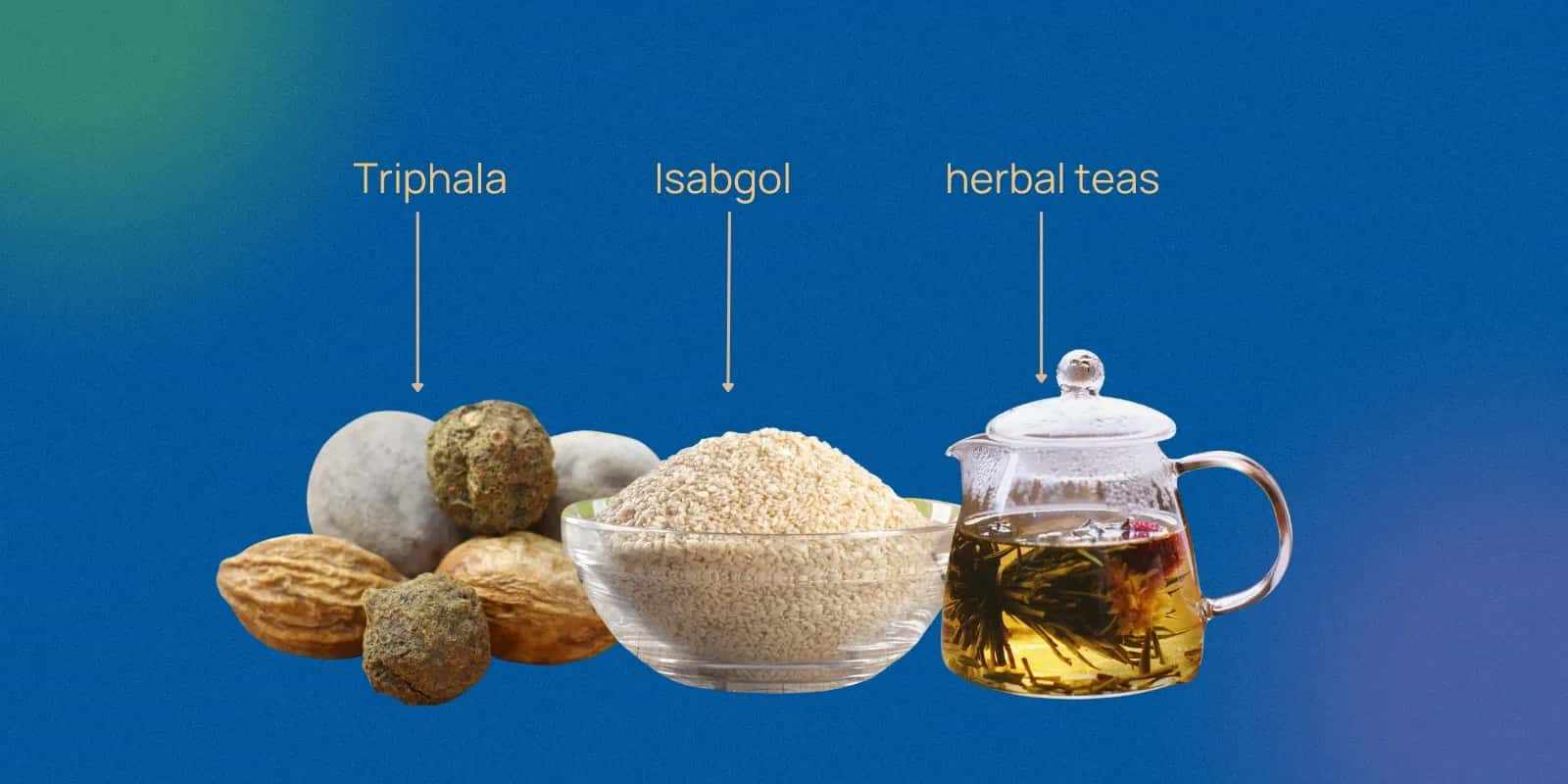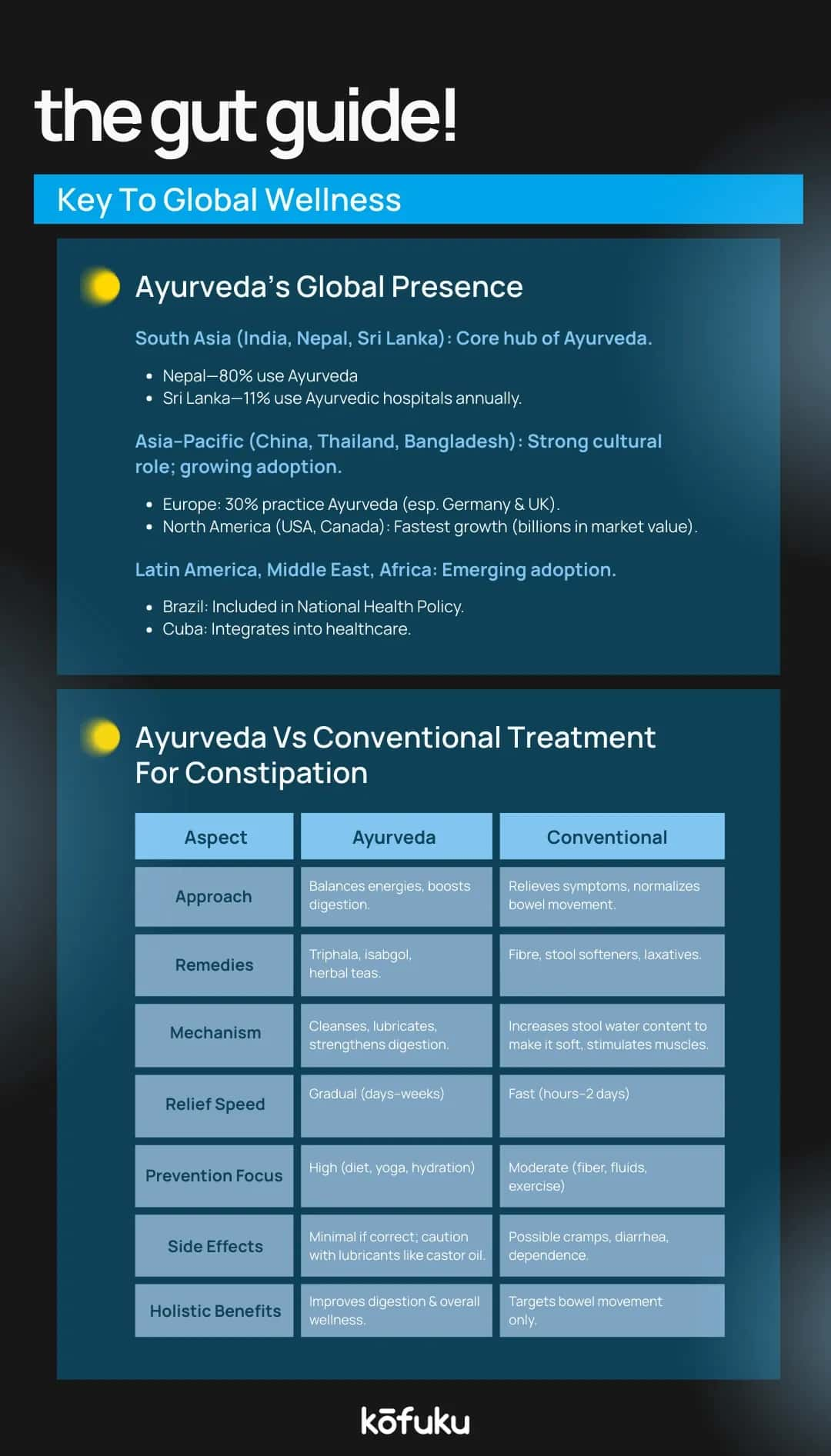Home
Blogs
Wellness Corner
Ayurvedic Treatments and Medicines for Constipation: Effective Natural Remedies to Cure Constipation
Ayurvedic Treatments and Medicines for Constipation: Effective Natural Remedies to Cure Constipation

Introduction
One of the most common disorders affecting millions of people is constipation. Every family has at least one member who is attempting to find lasting solutions to constipation. A lot of individuals turn to over-the-counter laxatives to relieve constipation symptoms, and these are temporary measures.
Vibandha, a term for constipation in Ayurveda, is caused due to irregular food habits and irregular bowel movements, besides psychological reasons. In India alone, around 80% of people rely on ayurvedic remedies for their health problems.
Through this blog, you will learn what constipation is, Ayurvedic treatment of constipation, the symptoms and treatment of constipation, home remedies for constipation, effects of constipation, symptoms and treatment for constipation in Ayurveda and much more.
Understanding Constipation from an Ayurvedic Perspective: Causes and Dosha Imbalances
What is Constipation in Ayurveda? Role of Vata Dosha in Digestive Health
Constipation in Ayurveda is related to the imbalance of the vata dosha, which has control over the downward flow in our body, such as the expulsion of bowels.
Colon moisture and lubrication are lost when vata dosha becomes excessively aggravated through a tendency to dry, cold or erratic eating and a sedentary lifestyle. A dry colon results in hard stools and irregular bowel movements.
Ayurvedic medicine for constipation focuses not just on clearing bowels but on restoring the dosha balance, hydrating the body and improving the digestive fibre, known as agni.
How Dosha Types Affect Constipation Symptoms and Treatment Approaches
-
Vata Type Constipation: In Ayurveda, vata type constipation is associated with dry stool, flatulence, bloating, and frequent eating. Warm, oily, and soft herbal laxative foods are the most suitable meals to treat this dosha.
-
Pitta Type Constipation: In Ayurveda, Pitta type constipation is associated with hot intestines, which causes burning and produces scanty stools. Amla is the best cooling herb that treats this dosha.
-
Kapha Type Constipation: According to Ayurveda, the definition of Kapha type constipation is mucus mixed with stools, heaviness and slow digestion. Treatment of this dosha can rely on stimulant spices and detoxifying herbs.
Top Ayurvedic Medicines and Tablets for Constipation Relief
Triphala: The Classic Ayurvedic Medicine for Constipation
Triphala is one of the best Ayurvedic medicines for constipation. It is a blend of amla, also known as indian gooseberry, haritaki and bibhitaki. It works as a gentle bowel cleanser and improves stool consistency without causing dependency. To consume Triphala, mix one tablespoon of Triphala powder with warm water and drink it before bedtime.
Senna and Swarnapatri: Powerful Herbal Laxatives
If you are seeking short-term ayurvedic remedies for constipation, herbs that stimulate bowel movements, such as senna, may help. Such herbs must be taken in small doses and under the supervision of medics, since excessive intake causes the intestinal organs to lose muscle.

Overview of Popular Constipation Ayurvedic Tablets and Their Benefits
Some of the top 10 Ayurvedic medicines for constipation include:
-
Triphala tablets
-
Isabgol husk tablets
-
Swarnapatri-based tablets
-
Amla tablets for cooling and detoxification
-
Haritaki tablets for Vata balance
When picking the most effective ayurvedic tablets for constipation, always seek the kind of formulation that accommodates your dosha, and its effects include long-lasting relief.
Natural Ayurvedic Remedies for Constipation: Herbs and Dietary Changes
Diet Recommendations to Balance Vata and Improve Bowel Movements
Remedies for constipation in Ayurveda suggest correcting your diet, as it is the first line of defence against constipation. Here are some key recommendations:
-
Increase warm, oily foods such as ghee, sesame oil, and stewed fruits.
-
Drink warm water throughout the day to maintain intestinal moisture.
-
Avoid cold drinks, raw salads, and overly dry foods that aggravate Vata.
Ayurvedic Herbs to Support Digestion and Relieve Constipation (Amla, Isabgol, Haritaki, and More)
-
Amla (Emblica officinalis): Rich in vitamin C, helps regulate Pitta and supports bowel regularity.
-
Isabgol (Psyllium husk): Softens stools and promotes easy passage.
-
Haritaki (Terminalia chebula): Known as the “king of medicines” in Ayurveda for its ability to regulate bowel movements.
-
Fennel seeds: Improve digestion and reduce bloating.
These herbs, when taken in the right combination, make some of the best medicines for constipation in Ayurveda that are safe and provide long-term relief.
Role of Ayurvedic Oil Therapies and External Treatments to Stimulate Digestive Health
Ayurvedic remedies for constipation are not only related to oral medications. Oil-based therapies help lubricate the colon, which stimulates smooth bowel movements.
-
Abhyanga (oil massage): Daily warm oil massage, especially over the abdomen, improves Vata balance.
-
Basti (medicated enema): Considered one of the most effective constipation Ayurvedic remedies, basti uses herbal oils or decoctions to cleanse the colon.

Yoga and Lifestyle Tips to Prevent and Manage Constipation According to Ayurveda
Lifestyle changes are crucial to ensure that constipation doesn’t become chronic:
-
Wake up early and allow time for a relaxed morning bowel routine.
-
Practice yoga asanas such as Pawanmuktasana, Malasana, and Bhujangasana to stimulate digestion.
-
Reduce stress through meditation or pranayama, as anxiety can aggravate Vata.
-
Maintain a consistent eating and sleeping schedule to keep Agni strong.

FAQs
Q. What is the best Ayurvedic medicine for constipation?
A. Triphala is often considered the best Ayurvedic medicine for constipation. It gently cleanses the bowel, balances all three doshas, and improves digestion without causing dependency, making it suitable for long-term use under Ayurvedic guidance.
Q. How effective is the Triphala tablet for constipation relief?
A. Triphala tablets are highly effective for mild to moderate constipation. They work by strengthening digestion, softening stools, and supporting regular bowel movements naturally, without the harsh effects of chemical laxatives, when taken consistently as per Ayurvedic recommendations.
Q. Can Ayurvedic medicine cure chronic constipation permanently?
A. Ayurvedic medicine can address chronic constipation by correcting the root cause, often a Vata imbalance, through herbs, diet, and lifestyle changes. Permanent results require consistent treatment, mindful eating, and regular habits rather than relying on quick-fix remedies.
Q. What diet changes support ayurvedic treatment for constipation?
A. Ayurveda recommends warm, cooked, and oily foods such as ghee, soups, and stewed fruits. Increasing water intake, avoiding processed and dry foods, and adding fibre-rich vegetables support bowel health and enhance the effectiveness of Ayurvedic constipation remedies.
Q. Are Ayurvedic tablets safe for everyone, including children and the elderly?
A. Many Ayurvedic tablets like Triphala and Isabgol are gentle and safe for most people, including children and elders, when taken in correct doses. However, dosage adjustments and professional consultation are essential before starting any herbal treatment.
Q. What are the top natural ayurvedic remedies for constipation?
A. Top Ayurvedic remedies include Triphala, Isabgol husk, Haritaki, Amla, warm milk with ghee, and fennel tea. These promote healthy digestion, soften stools, and regulate bowel movements without irritating the gut or causing long-term dependency.
Q. How does Ayurveda explain constipation and its causes?
A. Ayurveda links constipation primarily to aggravated Vata dosha, which dries and hardens stools. Poor diet, dehydration, irregular eating habits, stress, and a sedentary lifestyle disturb digestion (Agni), slowing bowel movement and causing irregular elimination patterns.
Q. Can Ayurvedic oil therapies help with constipation?
A. Yes. Ayurvedic oil therapies like Abhyanga (oil massage) and Basti (medicated enema) lubricate the colon, balance Vata dosha, and stimulate natural bowel movement, offering effective relief, especially in chronic and dry-type constipation cases.
Q. What lifestyle changes does Ayurveda recommend to prevent constipation?
A. Ayurveda advises waking up early, maintaining fixed meal times, drinking warm water, eating fibre-rich cooked foods, practising yoga asanas, reducing stress through meditation, and avoiding late-night meals to maintain healthy digestion and prevent constipation naturally.

Instant Indian Home Remedies for Constipation: Quick and Natural Ways to Cure Constipation

Best Pooping Position: Indian vs Western Toilet

7 Quick Remedies for Indigestion

18 Best Healthy Foods to Gain Weight Quickly and Safely

Are Sunflower Seeds Good for You? Nutrition, Benefits, and Planting Guide


